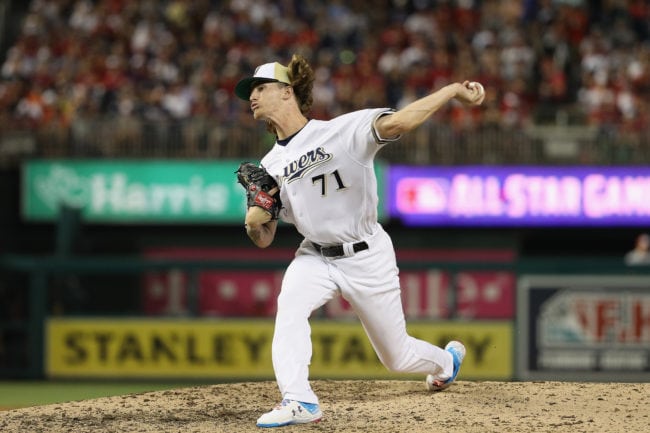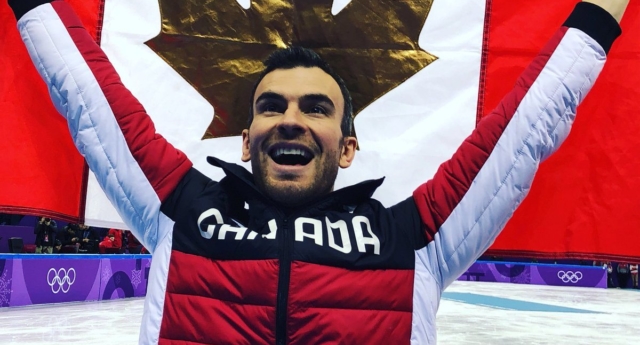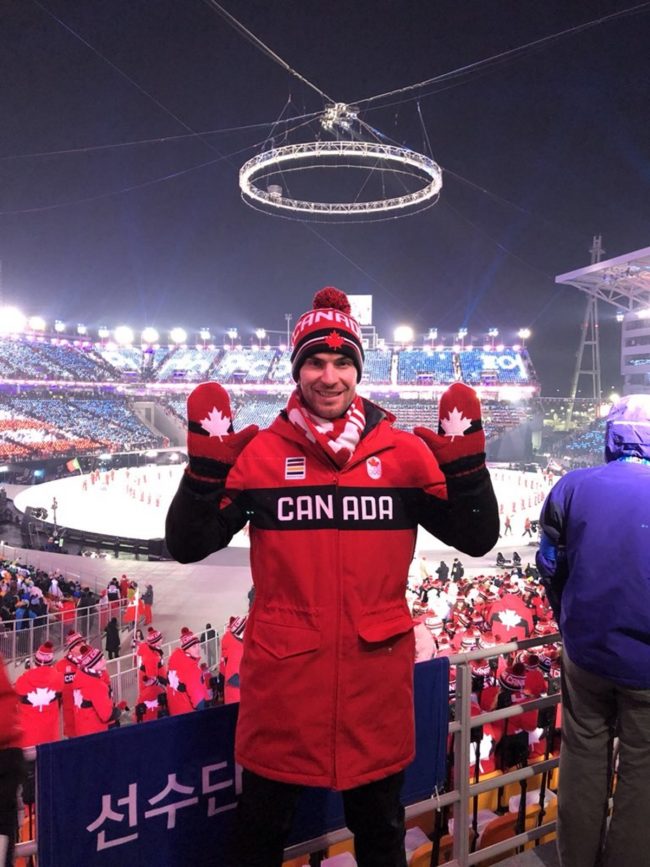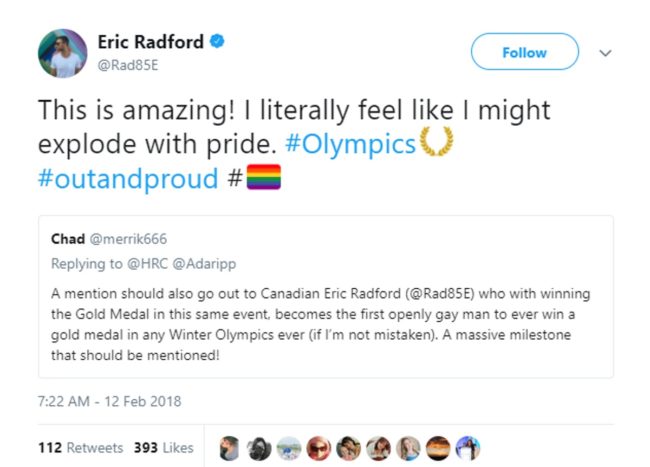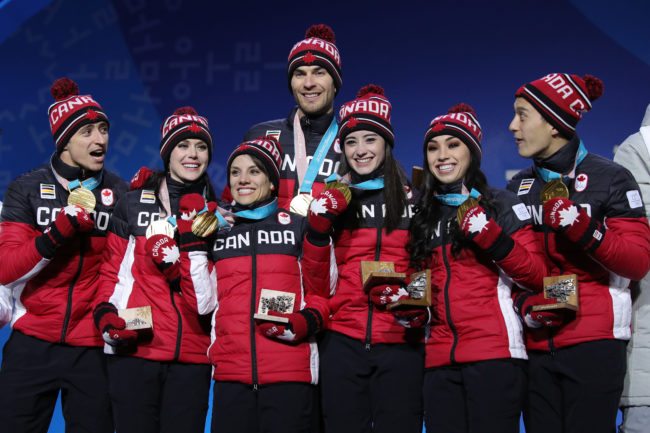Perspectives/ Sports/ Top Stories
Gay former Dallas Cowboy Jeff Rohrer is Marrying his Boyfriend
/cdn.vox-cdn.com/uploads/chorus_image/image/62329545/101318_JoshandJeff_0242_v2_2.0.jpg)
With Jeff Rohrer, you have to expect the unexpected.
When the 6-foot-3, 235-pound former Dallas Cowboys linebacker approached our table in the corner of a dimly lit Beverly Hills restaurant a couple of weeks ago, he was dressed like a stereotypical straight guy, clothes on the baggy side, carrying an over-sized duffel bag… and a delicately clenched martini.
Sitting down, he quickly launched into some questions for me, as well as ground rules for our conversation. He was nervously hopeful about this entire public coming-out process and the small collection of writers he had to open up to with his story. He wanted to share his story, but not all of it. Not yet.
Still, as we tip-toed into some questions about the first 59-plus years of his life it was clear Rohrer had a lot to say. There was an understated excitement about him, giving long, detailed answers to simple questions, like he couldn’t share his story quickly or deeply enough.
He’d been lying to himself about his own life for so long that now, with the opportunity to finally tell himself and the rest of the world hid truth, he just couldn’t talk fast enough.
The appetizer had barely been cleared before there was suddenly a redness in Rohrer’s eyes as conversation turned to his revelations since meeting his fiancé. His pace of speaking slowed.
As he talked about the reaction to his private coming out to some of his Cowboys teammates, his ex-wife, his friends in Los Angeles’ beach communities, and almost everyone else in his life, Rohrer became emotionally present with something bubbling inside of him.
I asked him what that was.
“Oh boy,” he said, quickly covering his face with his black napkin, a moment of raw emotion he simply hadn’t yet let out. We sat in silence for the better part of a minute, him present with the last few months of his life. When he pulled the napkin away, his eyes were scorched and watery.
”The kindness of my friends and my family and my teammates” he said, his voice trembling, pausing between words, doing everything he could to express the sudden joy that enveloped his new gay life. “It’s just been fucking ridiculous how nice they have been, and how supportive. And how they don’t care about any of that. They just love me, they always have. Nothing’s changed. Nothing’s changed.”
It was like a fog had lifted from his sight, and he saw his own kindness — years of generosity with teammates and friends — coming back to him. When his friends and family and teammates had told him over the years that they loved him, they really meant it. Who he had been with them in that time was far more important to them than what he is.
”To know that at a time like this, that they have my back, it’s fucking amazing. I never expected it. I figured the world is fucked, but it’s not. It’s amazing. It’s fucking amazing.”
A Dallas Cowboy marrying the man he loves
This Sunday at a not-so-small ceremony in Southern California, Rohrer will marry his boyfriend of two-plus years, Joshua Ross.
This was inconceivable for Rohrer just a few years ago. He had never, while he was playing in the NFL for the Cowboys or at any point during his marriage to his wife, dated men, had a boyfriend or had any kind of gay experience. While he pursued a life he loved, with people he still loves very much, there was still something he knew was a secret bubbling inside of him, a secret he could never let out.
:no_upscale()/cdn.vox-cdn.com/uploads/chorus_asset/file/13441483/111218_JoshJeff_Portrait_0432_01_01.jpeg)
“So many nights I cried myself to sleep, feeling like I was the Wolfman, or Jekyll and Hyde, or Frankenstein, some kind of monster that only comes out when it’s a full moon, always living in the shadows.”
It was an evening about three years ago that Rohrer let the Wolfman out, quietly making his way up Robertson Blvd. for an after-work cocktail at the popular gay West Hollywood watering hole, Tortilla Republic. Not out to anyone, he was simply “working in the area” and “wanted to avoid rush-hour traffic.” Like ya do.
It was there at the bar that he struck up a conversation with a young man named Josh. Sparks didn’t fly that night, but Rohrer said leaving the bar with the young man’s contact information, he knew he wanted to spend more time with Ross.
”I think we both knew where it was going.”
Where it was going was a place Rohrer had never been before. Still living with his ex-wife and with a career in the entertainment industry, he had built a story for his own life that revolved around family, film and football.
Yet he just had to see Ross again. It was a burning desire he had squelched in the past. All the while it had been there under the surface for years, something in his late 50s he simply couldn’t deny anymore.
“My experience is that people are born gay, and anyone who wants to dispute that I’d be happy to have a conversation with them, including Mike Pence. I’d love to sit down with him.”
Once a Cowboy, always a Cowboy
Rohrer played for the Dallas Cowboys for six seasons, spending his final 1988 season on the sideline with an injury. By the time Jimmy Johnson arrived in Dallas in 1989, ushering in an era of youth and renewed excitement, Rohrer was part of the old guard, and injured on top of that. Rohrer never played a down in the regular season for Johnson.
Before his NFL career was cut short, he was an integral part of America’s team. Over the course of those six seasons with the Cowboys he started 41 games for legendary coach Tom Landry, racking up 7.5 sacks and four fumble recoveries, all in his final four seasons.
When he was drafted in the second round out of Yale, some people scratched their heads — sports columnist Jim Lassiter called him “unheard of.” When Rohrer got the draft call from Cowboys player personnel guru Gil Brandt, he was studying for a final — He thought the call was a prank by friends.
Mind you, this was when the Ivy League was no slouch. His Yale Bulldogs won the Ivy League each of his last three seasons. While a second-round draft pick may have been a reach at the time, success surrounded Rohrer.
:no_upscale()/cdn.vox-cdn.com/uploads/chorus_asset/file/13441475/IMG_2344_01.jpeg)
In football, where he excelled wildly and crafted a professional career, Rohrer found a constant reason to keep his true feelings silent.
“Living with my family in that [Southern California] community, it was not acceptable. That was not part of the plan, and it wasn’t going to happen. When I went to Yale, it was the same thing there. And then I got drafted by the Cowboys. What am I going to do, come out then?”
The inertia of his life from youth to the NFL was unquestioned. He was just another red-blooded American boy playing football. “Straight” was simply assumed.
”Football is a gladiator sport. It’s very, very physical, very tough. At least at this point in our society, toughness is not associated with the gay community. It’s not a natural fit to a lot of people.”
Despite the perception, Rohrer isn’t sure he ever heard a gay slur in the Cowboys locker room.
“It was a football locker room, like every other locker room I’ve ever been in. Nothing was anti-gay.”
That reflects my interview with Cowboys Hall of Famer Michael Irvin several years ago. In that conversation The Playmaker said he believed that if a teammate had come out as gay to the rest of the Cowboys in the 1990s, they would have accepted him and moved on.
”I would agree with Michael,” Rohrer said. “The generation before him, I would say that’s true as well. I’m not sure about the Cowboy leadership, but the team, knowing the guys and especially how they have reacted to me so far, they wouldn’t have cared.”
Rohrer certainly would have never made that observation while he was in the middle of his Cowboys career. Whether or not there were gay slurs thrown around the locker room, there is a machismo in virtually every football locker room that seems to send an unspoken message exuding heterosexism.
Yet Rohrer now feels that aura is a lot of bluster. Yes, strength and power are admired in an NFL locker room. They are mandatory. But that doesn’t mean that strength and power must come from a straight guy.
“In professional football the game is so hard, and you have to be so good, and you have to be so spot on to make it, let alone to start, that there isn’t a lot of time to give much thought to somebody’s sexual orientation. It’s brutal. You get halfway through the season and half the guys are hurt. It’s a game of survival and courage, and there’s really not a lot of time for that kind of nonsense.”
There is some evidence to back up Rohrer’s new 20/20 hindsight. In the 1970s we know that multiple Washington football players – Dave Kopay, Jerry Smith, Ray McDonald – were gay, and that some of their teammates knew about them. Various Houston Oilers from the early 1990s have spoken publicly about knowing or assuming that at least two of their teammates were gay. All of the players said they dealt with it and moved on.
Yet in the midst of his career, Rohrer couldn’t see the accepting forest through the trees.
60 going on 16
On Christmas Day, Rohrer will turn 60. He jokes that Ross, a skin-care expert who grew up in Texas not far from the very stadium in which Rohrer played, insisted they get married before then so he wasn’t marrying someone in his 60s. Despite approaching retirement age, Rohrer said he hasn’t felt younger in literally decades.
In part that’s due to dating. While he certainly dated young women in his teens, and eventually married, the dating scene lacked for him the level of excitement that his buddies seemed to experience in their younger years. Now he knows what it felt like for his straight teen friends all those decades ago.
”I feel like I’m 16,” Rohrer said. “I feel revived. Like I’m born again. Again.”
He joked that some of his straight friends today are jealous of his new lifestyle. When he describes his week-to-week life to them, they can’t believe how much fun he’s having. Plus, he’s even looking younger, slimming down to near his playing weight at an age when so many of his friends and former teammates are headed in the opposite direction.
”I am in better shape now than I’ve been in in 20 years. I’m healthier than I have been in 20 years. I’m very, very happy.”
Gay acceptance is present in football
While he was playing football, Rohrer felt that this secret feeling inside of him was a curse.
“I asked God all the time, What is this? Why am I this person?”
The answer to his questions is finally being returned to him all these years later. At a time when acceptance of gay people is at an all-time high, there are still corners of our culture where homophobia runs rampant. Beyond finding a happiness he never thought possible for himself, he now has the opportunity to break into the dark corners of that culture where anti-gay sentiment festers.
A big, tough former NFL player on America’s Team, he’s a “straight talker” who would – quite literally if need be – give someone the shirt off his back. It’s hard to not like a guy like that. When he was married to a woman, a lot of people in places like Texas liked him very much. If it was hard to not like him when he was straight and married to a woman, for those very same people it will now be hard to not like him now that he’s gay and marrying a man.
”I’m not going to change the world, but we can at least get the message out there that it’s OK and I’m proud of where I am. I’m not ashamed. I’m not the Wolfman anymore. My family and friends are 100% behind me. That kind of message can maybe move the ball forward a little bit.”
Truth is, he’s faced very little negative reaction. Rohrer said he has told a handful of former Cowboys teammates, but word has spread through the “Cowboys family” very quickly. The level of acceptance has been far beyond his imagination.
Until just this year he couldn’t get his head around the idea that this extended family would ever accept him as a gay man. Yet with Josh’s prodding and support, Rohrer has given the people around him the opportunity to know the real Jeff Rohrer.
“It’s given me a new view on life and society and people and our country. I would have never expected it. I have just as many right- and left-leaning friends, and it doesn’t matter, the support cuts right through all of them.”
The chance to come out publicly as gay
Rohrer is now a successful commercial producer in Los Angeles. His Hollywood career has taken him where his NFL playing days never did: the Super Bowl. In the last few years he’s produced three Super Bowl commercials, for Doritos, Heinz and the NFL.
Coming out publicly in a couple of media appearances wasn’t what Rohrer had in mind ahead of his wedding. For the last couple of years he and Josh have lived what Rohrer called an “unnoticed” life together. Last year they attended the wedding of a gay couple — Josh’s friends in New York. Rohrer was painfully nervous about attending, as he figured the entire world would recognize the former Cowboy with a young man on his arm and he’d be outed.
Yet there was no Page Six article. No rumors swirled around the Cowboys family. Rohrer learned then that he could live his life more openly and gradually ease into his new love. It’s a lesson various gay former professional athletes have learned.
The wedding has made it easier to tell the people around him that he’s gay. In fact, he used the wedding invitations to do just that. When he sent out invitations to hundreds of people earlier this year, some of them replied with “Oh you’re so funny,” thinking it was Rohrer’s joking way of inviting them to an early 60th birthday party for himself.
When he explained that it wasn’t a joke, and he was indeed marrying his boyfriend, that got some phone calls.
“People are floored. I guess I was a really good actor.”
Now his impending marriage is also making it easier to tell the world. When he and Ross talked about their wedding, they asked their friend, Camille Grammer, about sharing the story with the world on their own terms. Ross, founder of SkinLab, has had his business featured on Real Housewives of Beverly Hills, in which Grammer has starred. Grammer introduced them to publicist Howard Bragman, who has taken dozens of athletes and celebrities out of the closet, including Michael Sam, Esera Tuaolo and John Amaechi. Now the couple gets to, as they hoped, tell their story in their own words.
Best of all, instead of some public announcement simply for the purpose of announcing his sexual orientation to the world, Rohrer and his fiancé Ross are featured in the New York Times and here on Outsports for their wedding.
Like the popular hashtag


